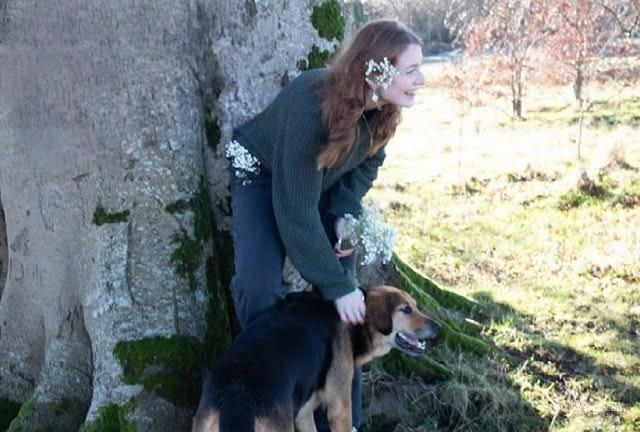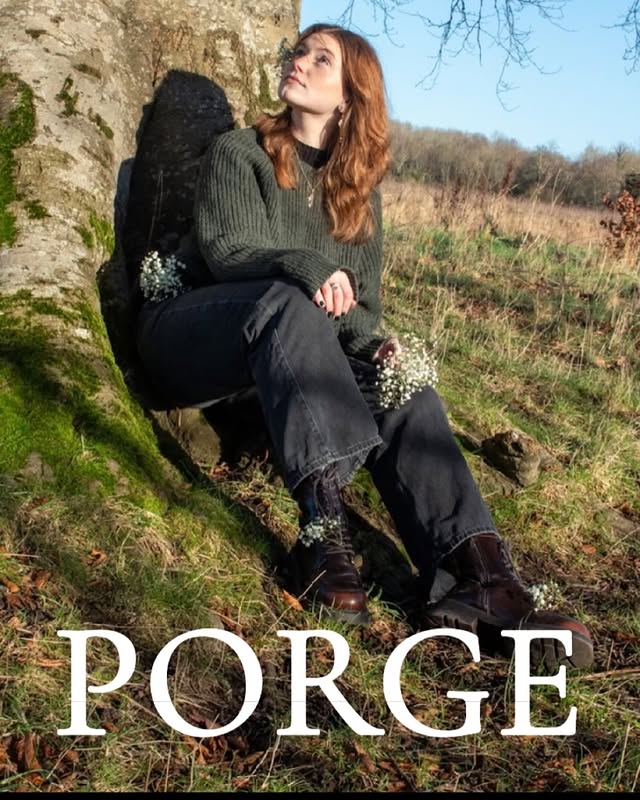Musician Georgia O’Toole gained performance experience whilst growing up in Celbridge, Co. Kildare. “I was always kind of into music from quite a young age,” Georgia tells Post-Burnout. “So, I started singing around the age of four, then I got into playing guitar at around the age of six or seven. I wasn’t very academic, per se, so I could strum a guitar and sing, so that was some sort of leverage in the world, I guess! [Laughs] I could entertain!
“My family noticed quite early that I was into music, so I ended up getting into musical theatre, choirs. I kind of performed in small festivals, guitar shows, anything that I could do that just got me doing something in regards to music. I’m in an area that’s probably a little traditional, so it’s nice to get out there a little bit more.
“Once I was in secondary school, I really took off as a solo artist for quite a long time. I did not go under Porge, though; I went under my actual name, Georgia. I performed every chance I got. I busked up in Roscommon, I would perform in pubs, just anything where I could get a bunch of experience. The typical thing of being paid in exposure, not money. [Laughs]”
Georgia got her footing as a musician by covering other artists. She feels that the songs she played gave her a foundation for crafting her own material. “I say once I was seventeen, I started doing my own stuff,” she says. “It took me a very long time to build confidence, I think, to engage in all of that stuff, so I ended up detouring for a little while before I started classifying myself as a real musician.
“I got into music psychology, and before I started college, I worked in hospitals for institutionalised patients as a music therapist. I did a lot of that stuff, and then once I had the experience in that, I was like, ‘Great, I’m actually going to lose my mind.’ [Laughs] So, then I went back to performing much more often, and then I got into BIMM, and everything kind of changed from there, I guess. Kind of went upward from there! [Laughs]”

Taken from Intagram/@porge_music_
While studying at BIMM, Georgia would meet Willow Leavey of Raining in December and SHALLO fame in their first year. “We had a module called Artist Development, which was disgusting!” proclaims Willow. “Triggering,” adds Georgia. “It was at nine A.M. on a Friday, and there were no other classes,” Willow continues.
“So, yeah, we had that class together and others in first year, and the first time we met was for a project. So, that class, you’d just be given shit to do [Laughs] and they just put you in groups and said, ‘Do it!’ […] So, the first project of that was to record and write a song through any means necessary; they didn’t have to be of a really, really high quality, and none of them were!
“I was writing at the time, and I moved after second year, because I was in Songwriting. We had three Songwriting students, Georgia (who was a Vocal student), a Guitar student who was then later moved to Vocals, and a Bass student. ‘Cool, we don’t have a drummer and we have sixteen songwriters!’ [Laughs] I was like, ‘Hey, I play drums. I guess I’ll be the drummer of this group!’”
Through the COVID-19 pandemic, Georgia and Willow struck up a remote friendship. At the time, Georgia was writing glassy folk music, inspired by the likes of Hozier, Dodie Clark, and Eva Cassidy. Willow was not too familiar with that genre, so the two mainly bonded over their mutual disdain for their jobs and their mutual love of metal music.
“I remember not long after we started talking through that class, I asked Willow to be my bassist for a performance assessment,” Georgia says. “Incorrect,” Willow interjects. “So, basically, Georgia had her first performance assessment, which would have been a little after Christmas or around that time, and I was like, ‘I’m sure this is going to be good.’
“I remember seeing Georgia perform, and she did ‘Sailin’ Shoes.’ I can’t remember the artist.” “I think it was Joey Landreth or something,” Georgia responds. “Your one,” continues Willow. “And she had a completely different band. I was like, ‘That’s really sick. She’s really good. I want to play bass for her.’ Because I was at that point where I was confident enough in my bass playing, that I could…play. [Laughs]
“So, I think you got off stage, and within five minutes, I told you, ‘You’re firing your old bassist.’” “Oh, my God, yeah!” laughs Georgia. “I remember that!” “I remember I came up to you, like, ‘Oh, yeah, you were so good up there. Good job,’” continues Willow. “And I think we were walking somewhere else, and I was like, ‘By the way, I’m your bass player now!’” “Basically, she adopted me,” Georgia adds.
After performing under her own name for years, Georgia felt that she wanted a moniker for this new chapter. “I was still Georgia to people,” she says. “Granted, I’m in a small community, so it’s just easier to go by my own name. When I got into BIMM…again, I always wanted to release music, but I was terrified [Laughs], so, obviously, I didn’t end up releasing anything until my final year.
“But the name Porge actually comes from a family nickname that I was given, growing up. I have a long, long list of nicknames from my family, but Porge was just one I was always called from a child. I don’t know the purpose of it, but I knew that I didn’t want my first release to be just Georgia; I wanted there to be some sort of different name that still meant something to me. So I ended up picking Porge.”
With Willow as a collaborator, the two began deconstructing and reworking the songs that Georgia had written. “Willow brings something very different to the table, because Willow just does Willow,” Georgia says. “I can have general ideas of how the bass could sound in my head, but, at the end of the day, what Willow brings to the table, I’ve never disliked. So, I definitely think that Willow brings a part to the songs that I could never bring, because it’s just a completely different perspective.
“I always talk about how important it is, earlier with bands and communication and all this, but I also think a huge thing is different types of thinkers, different types of writers, and how people approach things. I studied a module in Music Teaching, and after reviewing that, it kind of makes you look at everything differently – not just how people learn, but how people work together quite often.
“I think why myself and Willow work quite well together is because I will usually focus on lyrics and harmonies and the fluidity of this and the fluidity of that, whereas Willow will turn to me and be like, ‘OK, so I wrote this thing and it’s really, really cool!’, and it’s awesome. It’s literally amazing. I think having that…not necessarily super opposite, but definitely different approaches at times really works well together, and that’s why I have a lot of confidence in Porge itself going forward, because I know it’s going to grow and change.”
Last month, Porge released their first single, “Pretty Problem.” “I had wrote it in June of last year,” Georgia says of the track. “And it was one of the few songs that I have really played and was like, ‘Wow! I kind of like it!’ [Laughs] Where I was kind of like, ‘Wow, I don’t hate it,’ or I can’t completely break it down to the point where I wasn’t despising the song by the end of it, because that’s a really common thing with songwriters; you’ll write this song, then, two weeks later, you’re like, ‘Ew!’
“So, I had written it, I recorded it roughly, and I think over the summer me and Willow had met up, just to chat or talk shit or whatever like that, as per. [Laughs] I showed her the recording…I think we were literally walking through town, and I was, like, holding the phone up to her ear, like, ‘Listen, listen!’, and Willow seemed to like it, which was another green light for me, because I was like, ‘Oh, nice. My bassist likes it. I like it.’” “I was lying,” Willow adds. “Oh, well, it’s too late, now,” Georgia retorts.
“Pretty Problem” features some no-holds-barred and vulnerably sincere lyrics about Georgia’s self-doubts and insecurities. We asked Georgia how she felt about releasing such exposed and honest lyrics to the world. “I think when I first started writing, I thought a lot about what other people were thinking,” she responds. “There’s an instinct, sometimes, to hold off on certain lyrics, or not express certain things, or not swear in songs, or whatever, which definitely held me back when I was writing, because I would consider myself a classical theatre kid, where everything has to be conveyed.
“When I was writing ‘Pretty Problem,’ I got to a point where I was like, ‘I don’t care.’ Like, if it’s going to be emotionally vulnerable, if – God forbid – there’s going to be a bit of swear words in it, there’s going to be this or that, I was ready for it. I’m not usually a very emotionally open kind of person, and when I wrote ‘Pretty Problem’…Fun fact about me, I have epilepsy. I’ve had it for about a decade, and I’m very promotional about it on social media, about raising awareness and stuff, but I keep a lot of the private stuff private, you know?
“And ‘Pretty Problem’ was inspired by a lot of things within my life, but another part of that was going through a different medication change, diagnosis, all that kind of thing, and knowing you’re releasing a song and you’re family are going to be like, Click! I was like, ‘[Nervous laugh] Hey, guys, don’t listen to the lyrics too much! Look at this pretty bassline! Look at that!’ [Laughs]”
Hitherto, Georgia typically wrote the lion’s share of Porge’s songs before bringing them to Willow, who would add some additional layers, depth and complexity through her basslines. But the two feel that, going forward, the songwriting process will be more collaborative.
“Typically, when you join a band or an artist or anything like that, at least in my experience, there’s been a slight element of adjusting yourself for the music, for that artist, for what they want,” Willow says. “This happens a lot in Raining in December, where I’m very myself in that band, but there’s also a lot of Vinny [Liu, their frontman] saying, ‘Hey, I want this,’ and I take that idea and make it my own.
“Where, in Porge and in SHALLO, no one tells me what to do! I have, basically, complete, total freedom, which is, on the one hand, terrifying, but on the other hand, ‘This is really easy’ because if I have a really crazy, stupid idea, there’s no, ‘Oh, is this going to fit?’ No, this is the thing!”
Porge’s debut single, “Pretty Problem,” is on all streaming platforms now. You can keep up with Porge through Instagram, TikTok, and YouTube.
Tune into POSTBURNOUT.COM Interviews… tonight at 21:00 (IST) to hear this interview in full. Available on YouTube, Spotify, Apple Podcasts, and Amazon Music Podcasts.

Aaron Kavanagh is the Founder and Editor-in-Chief of Post-Burnout. His writing can also be found in the Irish Daily Star, Buzz.ie, Totally Dublin, The GOO, Headstuff, New Noise Magazine, XS Noize, DSCVRD and more.

 POST-BURNOUT
POST-BURNOUT